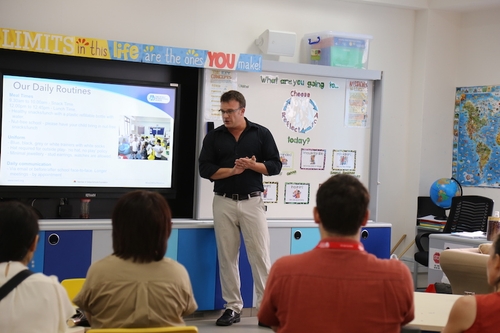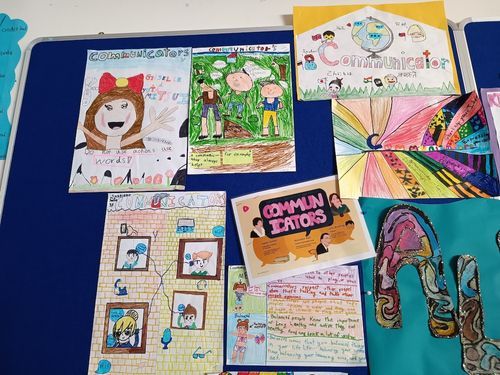It probably goes without saying that successful learning happens when teachers and students work well together. But there is another essential member of the learning team: YOU, the parent. When you’re involved in your child’s education, you share in the responsibility of supporting the learning experience. You’re better equipped to fulfil your role in your child’s learning journey when communication with your child’s school is efficient, timely and informative.
At OWIS, we have nine different communication channels to build relationships with our parent community. This gives parents multiple opportunities to engage with us via the method(s) with which they’re most comfortable.
1. Face-to-Face Meetings
Prior to the pandemic, we encouraged parents to meet briefly with our teachers before or after class when needed. However, due to COVID-19 restrictions, we’ve had to scale back in-person meetings. But if parents have specific concerns, they can still request for a direct meeting with a teacher after school hours.
2. Email Communication
Teachers, Tutors, Heads of Department (Secondary school) and Senior Coordinators send emails to inform parents on the school’s activities, programmes and student learning experiences. This allows for two-way communication for parents who prefer this method. We try to send emails often enough to keep parents in the loop, but not so frequently that we overwhelm them with updates.
3. Communication Apps for Early Childhood, Primary and Secondary School
When it comes to communication at OWIS, “there’s an app for that.” Our Early Childhood (EC) and Primary School teachers use Toddle to give parents weekly updates. Using photos and videos, teachers post students’ classwork-in-progress so parents can see more than just the end result. Parents can also watch their children participating in activities, such as show-and-tell, that they would otherwise miss out on.
We use Satchel to keep parents of our secondary school students “in the know” about exam schedules, timetables, at-home learning opportunities and other important information. Teachers use the app to keep track of students’ progress and behaviour as well.
4. Meet the Teacher Events
While we are still in Phase 2 of Singapore’s public health guidelines, this means of communication to parents at this point of time, is virtual. When meeting restrictions are not in place, parents meet their child’s teacher in-person at the beginning of Term 1 during a ‘Meet the teacher’ session and learn more about grade level routines, the curriculum, learning expectations and experiences.
5. Parent-Teacher Consultations
For now, these are also virtual. Parent-teacher consultations allow parents to talk to their child’s class teachers/tutors and understand how their children are doing in school personally, academically and socially. Consultations are held at the end of Terms 1 and 3 to talk about the student’s learning and achievements, progress as per learning objectives and address concerns, if any. Teachers also discuss class and school events and volunteer opportunities where parents can get involved in these events. At the end of Terms 2 and 4, we provide parents with a written report of their child’s progress.
6. Parent Workshops
Workshops for parents at different points during the year provide detailed information about our curricula and approach to learning. Workshops cover topics such as Phonics, English, Maths, and so on. Attending workshops helps parents support the learning process at home.
7. Updates Through Email-Newsletters
Our Head of School sends email-newsletters about once a week to update parents about the week’s activities in school, events, any new initiatives in school or changes to the school’s routines, policies and other important announcements. Parents of secondary school students also receive e-correspondence from our Senior Academic and Pastoral Coordinators. These briefings include summaries of topics covered by each class/grade in every subject. Additionally, we give parents monthly updates on Pastoral News. Parents really appreciate these emails, as they give them a better understanding of what their children are doing in class. We also keep parents posted about special events, such as school-wide celebrations for International Day and Kindness Week, dress-up days for festivals, Book Week, World Maths Day and so on.
8. School Blog
For parents of current and prospective students, our school blog provides detailed information about everything from our teaching philosophy to our state-of-the-art facilities. Blog posts encourage current and prospective parents to learn more about us and connect with our friendly team.
9. Social Media
A discussion on parent communication isn’t complete without mentioning social media. Our posts on LinkedIn, Instagram, Twitter and Facebook offer a glimpse into our dynamic school community, linking parents to educational resources, testimonials, teacher profiles and updates on school events.
All these communication channels at OWIS enable parents to be closely involved in their child’s education, making the learning experience more enjoyable.
When you collaborate with other members of our school community, you become a partner in your child’s education, setting your child up for long-term success. To learn more about communication at OWIS, contact us to schedule a virtual school tour.
This blog was originally written in collaboration with Jasween Gill, former Admissions and Communications Director, OWIS Nanyang and Suntec.














